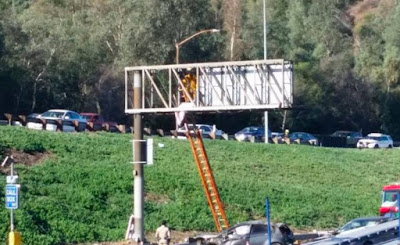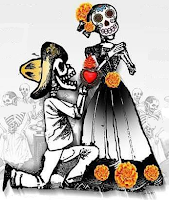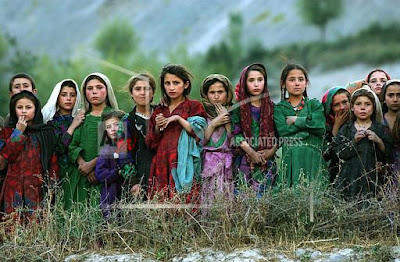.
"In
possible places, Brahmin, gifts reach them, but not in impossible places."
"And where, Master Gautama, are the 'possible' places, where the 'impossible' places?"
"Brahmin, there may be the case where a certain person [ignores the
Five Precepts and engages in one or more of the
Ten Courses of Unskillful Action and thereby makes
bad karma on the
Wrong Path]:
- One takes life
- takes what is not given
- engages in sexual misconduct
- engages in false speech
- engages in divisive speech
- engages in abusive speech
- engages in useless chatter
- is covetous
- bears ill will and/or
- holds wrong views.
 |
| Tibetan Book of the Dead (Bardo Thodol) |
"With the breakup of the body, after death, one reappears in a
purgatory. [No "
hell," however bad or long, is permanent]. One lives there, one remains there by means of whatever is the food of hellions (
narakas). This is an impossible place for that gift [to the dead] to accrue to one there.
"Then there is another case where a certain person takes life, takes what is not given, engages in sexual misconduct, engages in false speech, engages in divisive speech, engages in abusive speech, engages in useless chatter, is covetous, bears ill will, and holds wrong views.
"With the breakup of the body, after death, one reappears on
the plane of animals. One lives there, one remains there by means of whatever is the food of common animals. This, too, is an impossible place for that gift to accrue to one there.
 |
| What are those "things" that lurk in the dark -- ghosts, ETs, transforming-monsters... |
.
"Then there is the case where a certain person [engages in one or more of the
Ten Courses of Skillful Action and thereby makes
good karma on the
Right Path]:
- One refrains from taking life
- refrains from taking what is not given
- refrains from sexual misconduct
- refrains from false speech
- refrains from divisive speech
- refrains from abusive speech
- refrains from useless chatter
- is not covetous
- bears no ill will and/or
- holds right views.
 |
| Smile. I'll see you soon enough. |
"With the breakup of the body, after death, one reappears in the company of human beings. One lives there, one remains there by means of whatever is the food of human beings. This, too, is an impossible place for that gift to accrue to one there.
"Then there is another case where a certain person
refrains from [the Ten Courses of Unskillful Action]. With the breakup of the body, after death, one reappears in the company of
devas ("shining ones," angels, fairies, advanced beings dwelling in space). One lives there, one remains there by means of whatever is the food of
devas. This, too, is an impossible place for that gift to accrue to one there.
 |
| The worst place one will ever go to "sleep" -- death penalty advocates' torture pen (AP). |
 |
| In the Realm of Hungry Ghosts (Dr. Mate) |
"Then there is another case where a certain person [engages in one or more of the Ten Courses of Unskillful Action]. With the breakup of the body, after death, one reappears in
the realm of hungry ghosts. One lives there, one remains there by means of whatever is the food of hungry ghosts [and one is soothed by] means of whatever one's relatives and friends give in dedication.
This is the possible place for that gift to accrue to one there.
"But, Master Gautama, if that dead relative does not reappear in that possible place, who partakes of that gift?"
 |
| Give. The dead will be so grateful! |
"Other dead relatives, Brahmin, who have reappeared in that possible place [the realm of hungry ghosts]."
"But, Master Gautama, if that dead relative does not reappear in that possible place, and other dead relatives have not reappeared in that possible place, then who partakes of that gift?"
"It is impossible, Brahmin, it cannot be that over this long time that possible place is devoid of
one's dead relatives.* But at any rate, the donor is sure to gain a
reward.
- *The Monastic Disciplinary Code (Vinaya) counts as one's "relatives" all those related back through
seven generations past one's grandparents -- in other words, all of those descended from one's
great-great-great-great-great-great-great-grandparents.
"Does Master Gautama describe any preparation for the impossible places?"
 |
| Future ghost: youth, trauma, unexpected departure all make rebirth in ghost realm more likely. Death just before the Day of the Dead: Man, 20, drives
recklessly on Los Angeles freeway, rolls car, is ejected and thrown onto
freeway sign 25 feet up; hangs there for four hours through morning
traffic with bloody sheet (VIDEO: Fox2Now.com, St. Louis). |
 |
| Latin American Buddhists of L.A. |
"Brahmin, I do describe a preparation for the impossible places. A certain person takes life, takes what is not given, engages in sexual misconduct, engages in false speech, engages in divisive speech, engages in abusive speech, engages in useless chatter, is covetous, bears ill will, and holds wrong views. But that person gives food, drink, cloth, vehicles, garlands, scents, creams, bed, lodging, and lamps to ascetics and Brahmins [monastics and priests].
"With the breakup of the body, after death, one reappears in the company of elephants [as a partial consequence of one's karma]. There one receives food, drink, flowers, and various ornaments.
"It is because that person took life, took what is not given, engaged in sexual misconduct, engaged in false speech, engaged in divisive speech, engaged in abusive speech, engaged in useless chatter, was covetous, bore ill will, and/or held wrong views that one reappears in the company of elephants. But it is because one gave food, drink, cloth, vehicles, garlands, scents, creams, bed, lodging, and lamps to ascetics and Brahmins that one receives food, drink, flowers, and various ornaments.
"In another case a certain person takes life (kills)...holds wrong views (is deluded). But one gives...to ascetics and Brahmins. With the breakup of the body, after death, one reappears in the company of horses...in the company of cattle...in the company of poultry. There one receives food, drink, flowers, and various ornaments.*
- Apparently, "ornaments" for poultry would consist of brilliant
plumage. Similarly, "ornaments" for elephants, horses, and cattle
might consist of attractive markings.
It is because one [engaged in one or more of the Ten Courses of Unskillful Action] that one reappears in the company of poultry. But it is because one gave...to ascetics and Brahmins that one receives food, drink, flowers, and various ornaments.
 |
| Pagan Mabon celebration (danadeilers.com) |
"Then there is another case where a certain person
refrains from [engaging in one or more of the Ten Courses of Unskillful Action].
"With the breakup of the body, after death, one reappears in the company of
human beings. There one experiences the five strands of human sensuality [experiences delightful sights, sounds, smells, tastes, and tactile sensations].
"It is because one
refrained from taking what is not given, refrained from sexual misconduct, refrained from false speech, refrained from divisive speech, refrained from abusive speech, refrained from useless chatter, was not covetous, bore no ill will, and held right views that one reappears in the company of human beings. And it is because one gave food, drink, cloth, vehicles, garlands, scents, creams, bed, lodging, and lamps to ascetics and Brahmins that one experiences the five strands of human sensuality.*
- For some unknown reason, the older PTS translation of this sutra cuts off here.
 |
| Sometimes living is like being dead already. |
"Then there is another case where a certain person refrains from [engaging in the Ten Courses of Unskillful Action]. And one gives food, drink, cloth, vehicles, garlands, scents, creams, bed, lodging, and lamps to ascetics and Brahmins. With the breakup of the body, after death, one reappears in the company of
devas. There one experiences the five strands of divine sensuality [delightful sights, sounds, smells, tastes, and tactile sensations].
"It is because one refrained from taking what is not given...and held right views that one reappears in the company of
devas. And it is because one gave...to ascetics and Brahmins that one experiences the five strands of divine sensuality. But at any rate, Brahmin, the donor is assured of a
reward."
Reaction
 |
| The Buddha, Chinese depiction. |
"It is amazing, Master Gautama, it is astounding! It is enough to make one want to give a gift, enough to make one want to make an offering [knowing that at any rate] the donor does not go without reward [for this well-motivated act, intentional action, this good karma]."
"That is how it is, Brahmin, that is how it is. The donor does not go without reward."
"Magnificent, Master Gautama, magnificent! It is just as if one were to place upright what had been overturned, to reveal what was hidden, to show the way to one who was lost, or to carry a lamp into the dark so that those with eyes could see what was there to see!
"In the same way has Master Gautama -- through many lines of reasoning -- made the Dharma clear. I go to Master Gautama for guidance, to the Dharma, and to the
Sangha (Monastic Community). May Master Gautama remember me as a lay follower who has gone to him for guidance from this day forward for life."



















































































































































































































































































